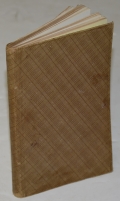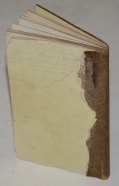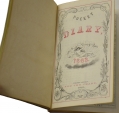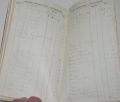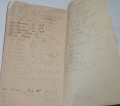site search
online catalog
1863 CIVILIAN CIVIL WAR DIARY BY EMILY ANN FIFIELD, MASSACHUSETTS LADY OF LITERARY SENSIBILITIES
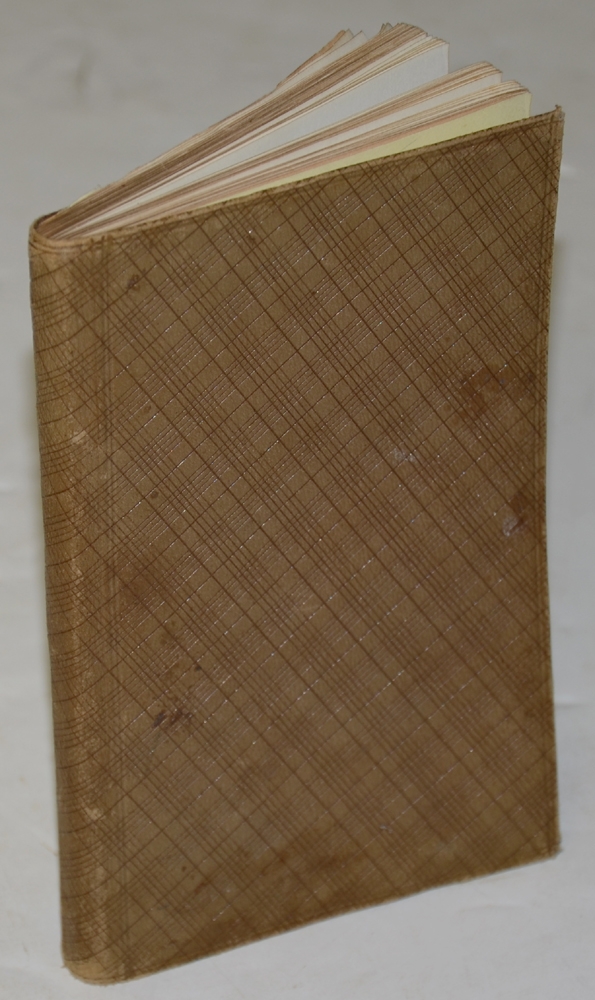
$295.00 SOLD
Quantity Available: None
Item Code: 450-159
Pocket Diary for 1863, Published Annually for the Trade, 1863. Brown leather-board covers, w/rear cover torn off. 6 x 3/5”, w/Lined entries (3 days per page), plus memoranda and cash account pages. Written in pencil & ink, w/ entries running continuously from Jan. 1 through March 17, then sporadically, then again continuously from November 24 through the end of the year.
Written inside the front cover in period pencil is, “Emily A. Fifield / from Wm”. Emily Ann Porter Fifield was born on February 12, 1838 in Weymouth, MA. " Mrs. Fifield is an active member of the Boston School Committee, where she is now serving her sixteenth year. She has been prominent for many years in philanthropic, religious, and educational work, and a valued force on several state and municipal boards. She has made a special study of school conditions in all parts of the country. In religeon a Unitarian, she is the recording secretary of the National Alliance, which is the leading women's organization of the Unitarian churched in America." {from American Series of Popular Biographies. MA Edition. This volume contains Biographical Sketches of Representative Citizens of the Commonwealth of MA. Boston: Graves & Steinbarger, 1891.} Emily died on April 2, 1913, in Milton, MA and is buried in Village Cemetery in Weymouth.
Emily’s husband was Dr. William Cranch Bond Fifield, a prominent Boston area physician. He was well-known as being anti-slavery, and was friends with William Lloyd Garrison and Wendell Phillips. He practiced in Weymouth from 1848 until 1861 and from 1861 until his death in Dorchester.
From American Series of Popular Biographies, MA Edition:
“Dr. FiField received education at Phillips Exeter Academy and in 1851, graduated from Harvard Medical School. He then went to England and took the full course in the Royal College of Surgeons, graduating with honers. He was also a licentiate of the Royal Ophthalmic Hospital in London, and he studied several years in Paris.
After his return from abroad, he practiced a few years with his father, Dr Noah Fifield of Weymouth, and then moved to Dorchester in 1861. He was a visiting surgeon in the Boston City Hospital for 15 years, and was a member of the consulting staff at the time of his death.
He was also an honorary member of the Boston Medical Improvement Society, a Fellow of the MA Medical Society, member of the Obstetric Society and the Dorchester medical Club and of the American Chirurgical Society.
Dr Fifield was of exceptional skill in his profession, and was a recognized authority throughout the state. As a medical expert, he was many years well known to the Norfolk and Suffolk bars.
His professional attainments, his unbounded generosity and kindness to the poor, his help in all movements for the public good, his keen wit and brilliant powers as a raconteur, made his name beloved and respected.
His anti-slavery training made him a believer in equal rights for women, and it was largely due to his efforts that they were admitted to equal fellowship in the MA Medical Society.”
Given her frequent references to aging and unwell parents, the diarist reveals herself as an early 30ish married matron. She is also one with an exceptionally wide social acquaintance. Many are the friends and relatives are mentioned, usually in a formal mode, by last names only. The base from which she writes is suburban Boston, with much visiting done in Weymouth. Through the year she makes the numerous social calls, recording the non-stop socializing which would be expected of a middle-class Bostonian matron of 1863. She records this social round smoothly, in matter of fact fashion, and is seldom critical. By and large, She reserves her concern for her brother, down with whooping cough, and her affection for her husband William in her closing, December 31st entry:
“My dear husband has just left on my desk a nice new diary for the new year. God keep and preserve him to me—my dear old Hubby! And teach me to care for him and love him more and more.”
On the cultural side, this anonymous diarist exhibits an exceptionally voracious literary sensibility, of the kind that could only be found in New England, and especially among Bostonian matrons. She records, in tail end memoranda, a lengthy list of not only books read but books lent, and to whom. [“To Miss Lindsby, Rose of Ashurst…To Mabel Carrington, Orphan Sisters,” etc., etc.]. Scratching a line through books returned.
She takes pains to list magazine articles as well, in de rigueur New England journals such as the Atlantic Monthly and the Liberator. She notes the “Reply to the Address of the Ladies of England” in the Jan. Atlantic,” and writes, “I read it to Ann“; then goes on to cite “Mr Garrison’s article signed “Credo” in the Liberator of Jan. 2. We also like very much Hogarth’s works.”
Her book list constitutes a veritable who’s who of authors likely to have perused by well bred Boston matrons of 1863—AGNES OF SORRENTO, Harriet Beecher Stowe; NO NAME, Wilkie Collins, MY DIARY NORTH AND SOUTH, W.H. Russell; DEERBROOK, Miss Harriet Martineau; JOURNAL OF A RESIDENCE ON A GEORGIAN PLANTATION, Fanny Kemble; AGE OF FABLE, Bullfinch; ORLEY FARM, Anthony Trollope; not forgetting Miss Austen…all of Jane Austen, that is to say, beginning with SENSE AND SENSIBILITY.
Given her literary tastes and acquaintance with the Atlantic Monthly and W. L. Garrison’s The Liberator, this anonymous Bostonian was, as might be suspected, a strong Union supporter. As such, although she and her immediate family seem to have been untouched by the war, she does spice her social commentary with snippets from military dispatches from the front:
From the month of January:
Jan. 1st—“Great rejoicing’s today over the President’s Emancipation Proclamation.”; 2nd—“Great battle near Murfreesboro; our forces under Rosecrans are victorious”; 3rd—“Everybody is pleased with the Emancipation Proclamation. Butler’s Farewell Address to the people of New Orleans is splendid!”; 4th—“news in the Sunday paper of the sinking of the famous “Monitor” near Cape Hatteras—2 officers, 38 men lost”; 9th—“Our troops were defeated at Vicksburg—it is reported by rebel papers”; 13th—“ Yesterday we had great news from the war. Colonel Burrell’s Regt. (42nd) was captured at Galveston, Texas. 2 of our gunboats taken. Vicksburg is not yet ours”; 14th—“Gen Butler had a great reception in Boston yesterday. Today the cavalry company of 100 men from California was received, with great doings”….
Of the Gettysburg, and the draft riots that followed, she has this to say:
July 4th —“Gen Hooker resigned and the Army of the Potomac under Gen. Meade. The quietist 4th of July that ever spend, and yet we have news of a great victory in Pennsylvania. There has been a great battle at Gettysburg and Lee has been repulsed. Gen. Meade appears to have done superbly; July 5—“A victory for our troops at Gettysburg, though with Tremendous loss of men. Vicksburg surrendered yesterday to U.S. forces under Grant”; July 6—“Cousin George W. Vining, uncle Elias’s younger son was shot through the head at Gettysburg. Several other Weymouth boys were also killed”; July 7—“Drafting is now commencing in Boston. Several men we know are among the unfortunates”; July 14—“The riot in New York has increased to 20,000 men who are burning and destroying property. They have torn up railroads and telegraph posts and all telegraphic communication with Boston is cut off.”; July 16—“the riot is almost entirely subdued in Boston, but rages on in New York….Port Hudson (on the Mississippi River) is ours!”
In all, an interesting Union Civilian diary. Solid collectible. [JP/LD]
~~~~~~~~~~~~~~~~~~~~~~~~~~~~~~~~~~~
THIS ITEM, AS WITH ALL OTHER ITEMS AVAILABLE ON OUR WEB SITE,
MAY BE PURCHASED THROUGH OUR LAYAWAY PROGRAM.
FOR OUR POLICIES AND TERMS,
CLICK ON ‘CONTACT US’ AT THE TOP OF ANY PAGE ON THE SITE,
THEN ON ‘LAYAWAY POLICY’.
THANK YOU!
Inquire About 1863 CIVILIAN CIVIL WAR DIARY BY EMILY ANN FIFIELD, MASSACHUSETTS LADY OF LITERARY SENSIBILITIES
For inquiries, please email us at [email protected]
Most Popular
Historical Firearms Stolen From The National Civil War Museum In Harrisburg, Pa »
Theft From Gravesite Of Gen. John Reynolds »
Cavalry Carbine Sling Swivel »
Fine Condition Brass Infantry Bugle Insignia »
featured item
1847 CONGRESSIONAL RESOLUTIONS OF THANKS TO GEN. ZACHARY TAYLOR AND HIS OFFICERS AND MEN FOR MONTERREY, PERSONALLY DISPATCHED BY PRESIDENT POLK
Zachary Taylor received the formal thanks of Congress three times, along with gold medals, for victories in the Mexican War, the largest number of such resolutions and awards made by Congress to anyone. This is an official State Department copy on… (766-938). Learn More »



